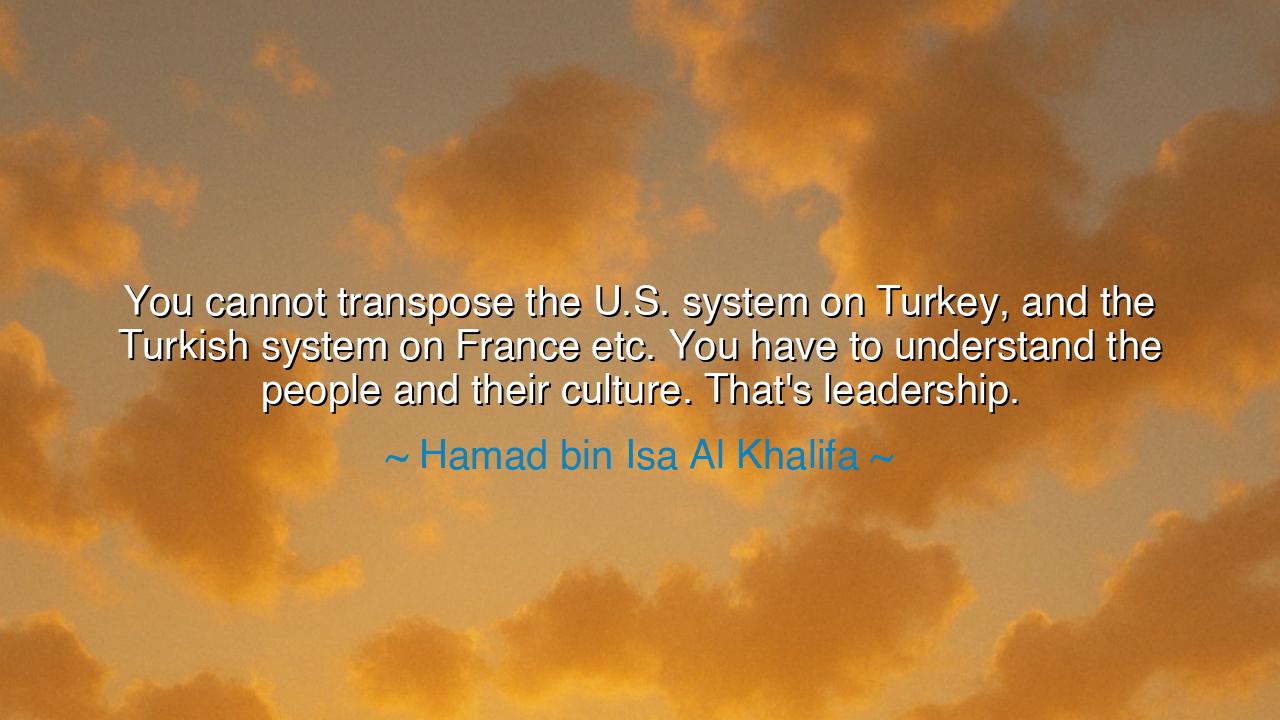
You cannot transpose the U.S. system on Turkey, and the Turkish
You cannot transpose the U.S. system on Turkey, and the Turkish system on France etc. You have to understand the people and their culture. That's leadership.






“You cannot transpose the U.S. system on Turkey, and the Turkish system on France etc. You have to understand the people and their culture. That's leadership.” — Hamad bin Isa Al Khalifa
Listen, O seeker of wisdom and guide of men, to these words of Hamad bin Isa Al Khalifa, the King of Bahrain, who spoke them not in arrogance, but in insight — born of one who has walked among many nations and observed the heart of human governance. In this saying, he reveals a truth that echoes through the corridors of time: that leadership is not the imposition of one pattern upon another, but the art of understanding the living soul of a people. To lead is not to copy; it is to comprehend. A system that thrives in one land may wither in another, for each nation, like each soul, has its own rhythm, its own breath, its own truth.
The origin of these words springs from the challenges of modern leadership in a world bound together yet divided by heritage. Hamad bin Isa Al Khalifa, ruler of an ancient kingdom at the crossroads of East and West, knew the delicate balance between tradition and progress. He saw nations attempt to borrow the institutions of others without first understanding the culture, the values, and the spirit that give those institutions life. To him, leadership meant more than governance — it meant empathy, wisdom, and deep respect for the people one serves. For a system is but a vessel; it is the soul of the people that fills it with meaning.
In every age, this truth has been tested. When Alexander the Great conquered the East, he did not destroy the cultures he met; he sought to understand them. He married their daughters, learned their customs, and invited their scholars to his side. In Egypt, he bowed to their gods and was crowned as Pharaoh. Though he came from Macedonia, he became a son of many lands. It was this gift of adaptation — the recognition that greatness lies in understanding — that allowed his empire to flourish beyond mere conquest. Alexander knew, as Hamad teaches, that to rule without empathy is tyranny, but to rule with understanding is leadership.
For to understand a people is to honor their story — their hopes, their fears, their songs and their silences. The wise leader does not demand that others think and live as he does; he listens, observes, and learns the hidden pulse of their hearts. Laws that bring harmony in one land may bring unrest in another if forced without care. Customs that sustain one nation may suffocate another if transplanted blindly. The soil of the human spirit is diverse — each people blooms according to its own sun and water. The leader’s task, therefore, is not to impose sameness, but to cultivate growth in harmony with nature.
Yet this wisdom is not for kings alone. It belongs to all who lead — in families, in workplaces, in communities. The teacher must understand the mind of the student; the parent, the heart of the child; the guide, the path of the traveler. When you seek to shape others without knowing who they are, you build upon sand. But when you lead with understanding, you build upon rock. For leadership is not power over others — it is communion with them. It is the courage to see through another’s eyes and to act for their good, not your glory.
The lesson, then, is this: do not seek to copy the forms of greatness — seek to grasp its spirit. What works in one place or for one soul may not work for another. True leadership begins not with action, but with understanding. Learn the stories of the people you lead. Listen to their laughter, their grief, their dreams. Adapt your vision to their nature as the river bends to the shape of its banks yet still flows forward. Only then will your leadership bear fruit — not as imitation, but as creation.
So remember, O child of wisdom, that every people, every soul, is a world unto itself. To lead them, you must first know them — their history, their temperament, their desires, their fears. You must enter their world not as a conqueror, but as a student. This is the essence of what Hamad bin Isa Al Khalifa spoke: that leadership is understanding, not command; harmony, not dominance. He who listens rules more deeply than he who orders, and he who learns serves more nobly than he who dictates. Thus, the wise leader does not seek to make all nations the same, but to help each rise according to its own truth — and in that diversity, the world finds its strength.
For in the end, it is not systems that endure, but understanding. Empires fade, laws crumble, and thrones fall — but the leader who honors the spirit of his people leaves behind something eternal: unity born of respect, progress born of compassion, and peace born of wisdom.






AAdministratorAdministrator
Welcome, honored guests. Please leave a comment, we will respond soon